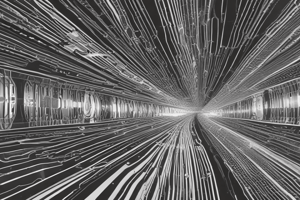Podcast
Questions and Answers
Match the following applications with their respective use of pattern matching:
Match the following applications with their respective use of pattern matching:
Image Processing = Give human recognition intelligence to machines Speech Recognition = Treat larger units such as words as patterns Seismic Analysis = Discover, image, and interpret temporal patterns in seismic array recordings Fingerprint Identification = Recognize and match fingerprints
Match the following techniques with their respective applications:
Match the following techniques with their respective applications:
Siamese Networks = Matching pairs of articles in news systems and search engines Pattern Matching = Giving human recognition intelligence to machines in image processing Statistical Pattern Recognition = Seismic analysis models Phoneme Level Description = Speech recognition algorithms
Match the following with their respective industries:
Match the following with their respective industries:
Biometric Market = Fingerprint recognition technology News Systems = Siamese neural networks for text matching Biological and Biomedical Imaging = Pattern matching in image processing Speech Recognition = Algorithms aiming to avoid phoneme level of description
Match the following with their respective goals:
Match the following with their respective goals:
Match the following with their respective uses:
Match the following with their respective uses:
Study Notes
Pattern Matching in Computer Science
Pattern matching is a fundamental concept in computer science, particularly in the field of pattern recognition. It involves the identification of patterns within data, which can be used for various applications, such as speaker identification, image processing, and seismic analysis.
Pattern Recognition
Pattern recognition is the process of identifying and classifying patterns in data. This can be done using machine learning algorithms or by applying statistical information extracted from patterns and their representation. The process often involves preprocessing the raw data to convert it into a form that can be used by a machine. Pattern recognition involves both classification and clustering of patterns.
Classification
In classification, a pattern is assigned a specific class label based on an abstract representation of patterns, which may be generated using a set of training patterns or domain knowledge. This is typically used in supervised learning.
Clustering
On the other hand, clustering involves generating a partition of the data, which can be used to aid in decision-making activities. This is used in unsupervised learning.
Pattern Matching Techniques
Graphical Decomposition and Convolutions
One approach to pattern matching is the use of graphical decomposition and convolutions. This involves representing a document as a weighted undirected graph, which helps to decompose the document into subsets of sentences, each focusing on a different sub-topic or concept.
Siamese Networks
Another approach is the use of Siamese neural networks for text matching. These networks have been used for matching pairs of articles in the context of news systems and search engines, where it is crucial to identify the relationship between articles.
Applications of Pattern Matching
Image Processing
Pattern matching is used to give human recognition intelligence to machines in image processing for various applications like biological and biomedical imaging, and computer vision.
Seismic Analysis
In seismic analysis, pattern recognition and signal processing methods are used to discover, image, and interpret temporal patterns in seismic array recordings, with statistical pattern recognition implemented and used in different types of seismic analysis models.
Speech Recognition
Pattern recognition is also used in speech recognition, specifically in various algorithms of speech recognition that aim to avoid the problems of using a phoneme level of description and treat larger units such as words as patterns.
Fingerprint Identification
Pattern recognition approaches are widely used in fingerprint matching, with fingerprint recognition technology being a dominant technology in the biometric market.
Studying That Suits You
Use AI to generate personalized quizzes and flashcards to suit your learning preferences.
Description
Test your understanding of pattern matching, a fundamental concept in computer science, including pattern recognition, classification, clustering, and its applications in image processing, seismic analysis, speech recognition, and fingerprint identification.




